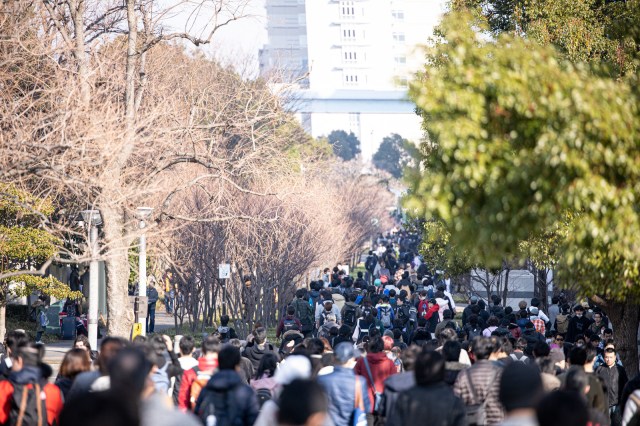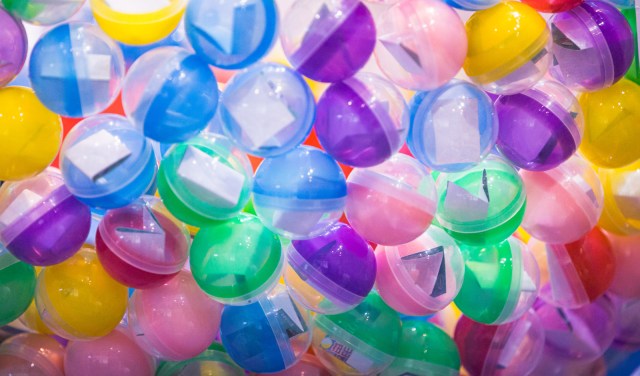
The top entry is a big surprise considering how large COVID-19’s influence looms in the list.
December is a month for reflection about the year we left unfurled behind us, which is why we get so many videos, articles, and general discussions about what everyone’s Top 10 of a given subject was for that year. Here we are at the end of 2021, a bizarre and lumpy year in all kinds of ways—but no matter how strange the year is, culture and language march on. Each year Japan likes to wrap up with the year as defined by kanji or new slang that summarizes the year.
On November 30, Sanseido, the illustrious Japanese dictionary company, announced its top ranking of “new words,” either brand-new terms or ones that have taken on a new significance, for the year 2021. What sort of results did this wild year produce? Well, there are plenty of responses to the COVID-19 pandemic in here…but there are some bright highlights, too.
Let’s take a look at the top five contenders, finishing with the word crowned New Word of the Year 2021!
5. Jinryu (人流, literally “people flow”)
▼ Does this photo give anyone else instant anxiety? Just me?
This word, as you might have guessed, isn’t exactly new—it’s more that it’s gained a much more loaded connotation since 2019 when the COVID-19 pandemic began. Jinryu, which you could also think of “community traffic,” refers to the literal flow of people through certain areas, as in how many people are in one place at a given time in the day and traveling around versus how many remain there at night. In these pandemic-ridden times, though, it’s typically used as a reference point for why the current level of COVID-19 spread might go up or down. Search online for COVID-19 info and you’ll find jinryu information about how many people passed through an area.
The word also caused controversy because, well….it really wasn’t commonly used before now. It was more common to talk about the flow of foot traffic with hito no nagare (人の流れ), so when jinryu cropped up in news reports and daily COVID-19 discussions, many laypeople weren’t certain what exactly it meant.
4. Nagesen (投げ銭, literally “tossed coin”)
This was a pre-existing word too, which did actually refer to the act of tossing coins to street performers (though not necessarily to your Witcher.)
In 2021, though, it’s increasingly being used for giving money to performers in digital spaces. With many people turning to socially-distanced careers like streaming themselves playing videogames, performing musical acts, or even just chatting, viewers are encouraged to “tip” or “donate”. Sometimes making a donation will cause the streamer to react or read out a message, or animations will play. At any rate, the concept of easily wiring cash over to someone you’re watching online has only grown stronger this year, much to the chagrin of parents who find the charges on their credit card afterward.
3. Maritozzo (マリトッツォ)
This word…is Italian! It’s a new entry to the Japanese lexicon, though.
▼ Maritozzo studded with strawberry slices.
マリトッツォ食べたので東京に染まりました pic.twitter.com/kPDItpu8Hj
— TIE Gian(じゃいあん) (@TIE_Gian) November 28, 2021
Maritozzo is an Italian sweet said to date all the way back to the days of ancient Rome. It consists of a sweet dessert bread absolutely stuffed with sweetened cream, and as you can see in the above photo, there’s a tendency to garnish them with fresh fruit and other delicious morsels. Much like the boba boom of recent years, these cute, puffy treats have become a must-have dessert due to their photogenic look and delicious taste. There are even sushi versions out there!
2. Nani-nani Gacha (〇〇ガチャ, or “[insert noun here] roulette”)
▼ A colorful array of gacha machine capsules.
You’re here, reading SoraNews24, so you probably know about gachapon machines…but just in case, they’re machines that dispense random prizes in a plastic capsule. The gacha part is an onomatopoeia for the clunking noise as you turn the handle of the machine, with the pon being the sound as your prize ball drops down into the collection tray. Over time, though, gacha has come to stand for random draws of any kind, including those for nonphysical items used in app games.
But this 2021 edition goes a level deeper than even that. Here, gacha is used as a suffix to denote anything with a random aspect of luck. One of the newest examples is oya-gacha—the parent roulette. Basically, it’s a lament that your luck in life is predestined based on the circumstances of your parents. If you drew two rich high-flier parents who’ll give you tons of love, support, and financial connections, that’s like drawing an SSR (super-super-rarity). You can also add things like “(work) boss”, “neighbors”, “birthplace” and so on before the “gacha” part.
Time for the number one entry. We’ve had a lot of dreary words pop up in this list…but thankfully, the big winner is something even sweeter than Maritozzo.
1. Chirui (チルィ, or “chilly”)
▼ This lady looks super chilly, but is she also chirui?
Hang on, I hear you protest. That’s not a new word. That’s not even a Japanese word! That’s just the English word “chilly”!
Well, yes, and also no. While the winner of the new word of the year is derived from English, it’s not as simple a translation as you might think. The 2021 Japanese edition of “chilly” is an adjective (many indigenous Japanese adjectives end in -i) based on the English phrase “chill out”—specifically the aura of being calm, relaxed, and at peace with your surroundings. Maybe a strange choice in a year as turbulent as this one, but very welcome all the same!
What Japanese word would you use to summarize 2021? Let us know in the comments!
Source: Oricon News via Livedoor News via My Game News Flash
Top image: Pakutaso
Insert images: Pakutaso (1,2,3)
● Want to hear about SoraNews24’s latest articles as soon as they’re published? Follow us on Facebook and Twitter!




 COVID-19 turnabout—pandemic in Japan unexpectedly revives, instead of exterminates, a dying art
COVID-19 turnabout—pandemic in Japan unexpectedly revives, instead of exterminates, a dying art Gacha machine backpack is Japan’s hottest new fashion statement
Gacha machine backpack is Japan’s hottest new fashion statement Yakuza leadership airs complaints about COVID-19’s effect on money gains and operations
Yakuza leadership airs complaints about COVID-19’s effect on money gains and operations Home-hunting in Japan changes as people eye new communities in wake of COVID-19
Home-hunting in Japan changes as people eye new communities in wake of COVID-19 Population aging in Japan gets a corona-boost as pregnancies drop by 11 percent this year
Population aging in Japan gets a corona-boost as pregnancies drop by 11 percent this year McDonald’s new Happy Meals offer up cute and practical Sanrio lifestyle goods
McDonald’s new Happy Meals offer up cute and practical Sanrio lifestyle goods All-you-can-drink Starbucks and amazing views part of Tokyo’s new 170 meter-high sky lounge
All-you-can-drink Starbucks and amazing views part of Tokyo’s new 170 meter-high sky lounge More foreign tourists than ever before in history visited Japan last month
More foreign tourists than ever before in history visited Japan last month Beautiful Sailor Moon manhole cover coasters being given out for free by Tokyo tourist center
Beautiful Sailor Moon manhole cover coasters being given out for free by Tokyo tourist center Is the new Shinkansen Train Desk ticket worth it?
Is the new Shinkansen Train Desk ticket worth it? Arrest proves a common Japanese saying about apologies and police
Arrest proves a common Japanese saying about apologies and police Starbucks reopens at Shibuya Scramble Crossing with new look and design concept
Starbucks reopens at Shibuya Scramble Crossing with new look and design concept The oldest tunnel in Japan is believed to be haunted, and strange things happen when we go there
The oldest tunnel in Japan is believed to be haunted, and strange things happen when we go there Hey, Japanese taxi driver! Take us to your favorite restaurant in Tsuruga City!
Hey, Japanese taxi driver! Take us to your favorite restaurant in Tsuruga City! Hello Kitty isn’t a cat!? We called Sanrio to find out!
Hello Kitty isn’t a cat!? We called Sanrio to find out! Disney princesses get official manga makeovers for Manga Princess Cafe opening in Tokyo
Disney princesses get official manga makeovers for Manga Princess Cafe opening in Tokyo We try out “Chan Ramen”, an underground type of ramen popular in the ramen community
We try out “Chan Ramen”, an underground type of ramen popular in the ramen community Beautiful new Final Fantasy T-shirt collection on the way from Uniqlo【Photos】
Beautiful new Final Fantasy T-shirt collection on the way from Uniqlo【Photos】 Foreign English teachers in Japan pick their favorite Japanese-language phrases【Survey】
Foreign English teachers in Japan pick their favorite Japanese-language phrases【Survey】 There’s a park inside Japan where you can also see Japan inside the park
There’s a park inside Japan where you can also see Japan inside the park Japanese convenience store packs a whole bento into an onigiri rice ball
Japanese convenience store packs a whole bento into an onigiri rice ball Studio Ghibli releases Kiki’s Delivery Service chocolate cake pouches in Japan
Studio Ghibli releases Kiki’s Delivery Service chocolate cake pouches in Japan Japan’s bone-breaking and record-breaking roller coaster is permanently shutting down
Japan’s bone-breaking and record-breaking roller coaster is permanently shutting down New definition of “Japanese whiskey” goes into effect to prevent fakes from fooling overseas buyers
New definition of “Japanese whiskey” goes into effect to prevent fakes from fooling overseas buyers Foreign passenger shoves conductor on one of the last full runs for Japan’s Thunderbird train
Foreign passenger shoves conductor on one of the last full runs for Japan’s Thunderbird train Our Japanese reporter visits Costco in the U.S., finds super American and very Japanese things
Our Japanese reporter visits Costco in the U.S., finds super American and very Japanese things Kyoto bans tourists from geisha alleys in Gion, with fines for those who don’t follow rules
Kyoto bans tourists from geisha alleys in Gion, with fines for those who don’t follow rules Studio Ghibli unveils Mother’s Day gift set that captures the love in My Neighbour Totoro
Studio Ghibli unveils Mother’s Day gift set that captures the love in My Neighbour Totoro Domino’s Japan now sells…pizza ears?
Domino’s Japan now sells…pizza ears? New Japanese KitKat flavour stars Sanrio characters, including Hello Kitty
New Japanese KitKat flavour stars Sanrio characters, including Hello Kitty Sales of Japan’s most convenient train ticket/shopping payment cards suspended indefinitely
Sales of Japan’s most convenient train ticket/shopping payment cards suspended indefinitely Sold-out Studio Ghibli desktop humidifiers are back so Totoro can help you through the dry season
Sold-out Studio Ghibli desktop humidifiers are back so Totoro can help you through the dry season Japanese government to make first change to romanization spelling rules since the 1950s
Japanese government to make first change to romanization spelling rules since the 1950s Ghibli founders Toshio Suzuki and Hayao Miyazaki contribute to Japanese whisky Totoro label design
Ghibli founders Toshio Suzuki and Hayao Miyazaki contribute to Japanese whisky Totoro label design Doraemon found buried at sea as scene from 1993 anime becomes real life【Photos】
Doraemon found buried at sea as scene from 1993 anime becomes real life【Photos】 Tokyo’s most famous Starbucks is closed
Tokyo’s most famous Starbucks is closed One Piece characters’ nationalities revealed, but fans have mixed opinions
One Piece characters’ nationalities revealed, but fans have mixed opinions We asked a Uniqlo employee what four things we should buy and their suggestions didn’t disappoint
We asked a Uniqlo employee what four things we should buy and their suggestions didn’t disappoint Princesses, fruits, and blacksmiths: Study reveals the 30 most unusual family names in Japan
Princesses, fruits, and blacksmiths: Study reveals the 30 most unusual family names in Japan Studio Ghibli’s new desktop Howl’s Moving Castle will take your stationery on an adventure
Studio Ghibli’s new desktop Howl’s Moving Castle will take your stationery on an adventure Gacha capsule machines now dispense perfumes in Japan
Gacha capsule machines now dispense perfumes in Japan “Have fun seeing what comes out” gacha machine is a mystery in more ways than one
“Have fun seeing what comes out” gacha machine is a mystery in more ways than one No coins? Not a problem for Japan’s new cashless gachapon capsule toy vending machines
No coins? Not a problem for Japan’s new cashless gachapon capsule toy vending machines Rate of young Japanese people who want to get married someday drops to lowest ever in survey
Rate of young Japanese people who want to get married someday drops to lowest ever in survey 74-year-old Japanese politician starts Instagram account for open dialog about COVID-19
74-year-old Japanese politician starts Instagram account for open dialog about COVID-19 Cost of uneaten ehomaki sushi rolls in 2022 estimated to be over one billion yen
Cost of uneaten ehomaki sushi rolls in 2022 estimated to be over one billion yen Design company to hold socially distanced night saunas where you can gaze at Tokyo Tower
Design company to hold socially distanced night saunas where you can gaze at Tokyo Tower Japanese government is shutting down its COVID contract-tracing app
Japanese government is shutting down its COVID contract-tracing app Win a room or bed on an overnight boat from Nagoya in ferry’s Boat Gacha campaign
Win a room or bed on an overnight boat from Nagoya in ferry’s Boat Gacha campaign Wanna win a Nintendo Switch? You can with this gigantic gacha capsule machine in Nara【Photos】
Wanna win a Nintendo Switch? You can with this gigantic gacha capsule machine in Nara【Photos】 We eat an intimidating curry with toppings randomly chosen for us by CoCo Ichibanya’s ‘Gacha’ app
We eat an intimidating curry with toppings randomly chosen for us by CoCo Ichibanya’s ‘Gacha’ app Akihabara Radio Kaikan’s gacha capsule toy lucky bag is an otaku delight【Photos】
Akihabara Radio Kaikan’s gacha capsule toy lucky bag is an otaku delight【Photos】 Japanese governmental employees in frantic pencil-shaving spree to meet city election day
Japanese governmental employees in frantic pencil-shaving spree to meet city election day COVID-19 appears to be suppressing the flu in Japan, number of cases down and decreasing
COVID-19 appears to be suppressing the flu in Japan, number of cases down and decreasing Japanese toilet fans rejoice — bidet-style washlet water guns are here!
Japanese toilet fans rejoice — bidet-style washlet water guns are here! Japanese soccer team fined 20 million yen because fans’ cheering violated COVID-19 guidelines
Japanese soccer team fined 20 million yen because fans’ cheering violated COVID-19 guidelines
Leave a Reply